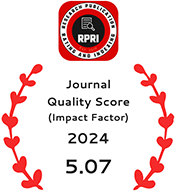Investigation of Geographical Factors of National Power
DOI:
https://doi.org/10.55544/jrasb.3.1.7Keywords:
border, geography, geopolitical position, national powerAbstract
National power as a geopolitical concept reflects a characteristic and collective trait of the people of a nation and at the same time, it is manifested as an individual trait in relation to a country and a government. When power is viewed in the form of a society or a nation, its general and overall power appears from the outcome of that society's abilities. In political geography, which examines the role of geographical environment factors in the power of nations, The role of each country in the national power does not depend only on the thoughts and opinions of the rulers of that government, but there are factors that increase or decrease the national power. To identify and measure the national power of a country, you cannot rely on one element alone; Rather, national power has various origins and principles that produce national power in a collective function. In other words, the main factors shaping the national power of countries are located in different fields. One of the main areas influencing national power is geographical factors. Therefore, geography has a special importance in examining and analyzing the national power of a country. While providing a detailed description of the geographical factors of national power, this article seeks to answer the question, which geographical factors are effective in the national power of countries, based on reliable library sources? The results of this research show the value of the geopolitical position, the size, shape, nature of the borders, and the structure of the land or unevenness in the national power of the countries.
Downloads
References
Abdul Alipour, Qadir. (1400). The place of soft power in the conceptualization of national power with an emphasis on the religious approach. Quarterly
Alam, Abdul Rahman. (1383). Foundations of political science. 11th edition Tehran: Nei Publications.
Azimi, Mohammad Azim, (2015). An introduction to Afghanistan's national security (geography and environment). Kabul: Negar Publications.
Ezzati, Ezzatullah. (1388). Geopolitics. Eighth edition. Tehran: Samit Publications.
Hafeznia, Mohammad Reza and Kaviani Rad, Murad. (2015). Philosophy of political geography. second edition. Tehran: Publications of Strategic Studies Institute.
Hafeznia, Mohammad Reza, Zarkani, Seyedhadi, Ahmadipour, Zahra and Raknuddin Iftikhari, Abdul Reza. (1385). Designing a model for measuring the national power of countries. Geopolitics Quarterly, 2nd year, 2nd issue, summer 2015, pp. 46-73.
Hafeznia, Mohammad Reza. (1396). Principles and concepts of geopolitics. Fifth Edition. Mashhad: Papli Publications
Kamran, Hassan, Ghulami, Bahadur, Yari Islam, Hussaini Amini, Hassan, Khalidi. (1389), Geoghraphia and National Powers of Iran, Journal of Applied Research in Geographical Sciences, Volume, 13, Issue ,16 ,Spring ,1389, pp, 5-2
Mir Haidar Darreh (Mohajrani), (1389), Geographical and Political Basics of Tehran, fifteen Publications, Samat
Naqib Zada Ahmad (1396), in study of Political Sociology, Tehran, Publication of Samat
Qawam, Abdul Ali. (2011). Principles of foreign policy and international politics. Tehran. Side Publications.
Rahimi, Sardar Mohammad and Arefi, Abbas. (2019). Afghanistan geopolitics and conflict (domestic, regional and global approach). Kabul: Word Publications.
Rahimi, Sardar Mohammad. (2011). Geopolitics of Afghanistan in the 20th century (developments, approaches, consequences). Kabul: Saeed Publications.
Royan, Abdul Qadir and Amiri, Zia Al Haq. (2012). Political geography of the world. Kabul: Saeed Publications.
Safi, Vadir. (2019). General international law. 9th edition. Kabul: Saeed Publications.
Sataish Manesh, Mehdi. (1402). Investigating and identifying the sources of national power. Geography and human relations, summer 1402, period 6, number 6, pp. 116-140.
Seif Zadeh, Seyyed Hossein. (1385). The mystery of security and the new challenges of the West. second edition. Tehran: Publications of the Ministry of Foreign Affairs.
Sharifi, Alireza. (1395). Principles of international relations. First Edition. Kabul: Gohar Shad Publications.
Siddique, Ahmed Fawad. (1400). Basics of political science. Herat: Quds Publishing House.
Wasiq, Mahmood, Rezai Saka Rawani, Dawood and Chanari, Samiran,(1396), The Impact of Spatial Minorities on National Power (with Emphasis on Ethnic Minorities). Human Geographical Research, Volume, Forty-Ninth, Issue, 3, Fall, 2017
Zarei, Bahadur. (2012). Theoretical foundations of political geography (with emphasis on Islam and Iran). second edition. Tehran: Tehran University Press
Zarqani, Seyyed Hadi. (1389). Criticism and analysis of national power measurement models. Geopolitics Quarterly, 6th year, 1st issue, spring 2019, pp. 149-180
Downloads
Published
How to Cite
Issue
Section
License
Copyright (c) 2024 Rohullah Muradi

This work is licensed under a Creative Commons Attribution-NonCommercial-NoDerivatives 4.0 International License.


















